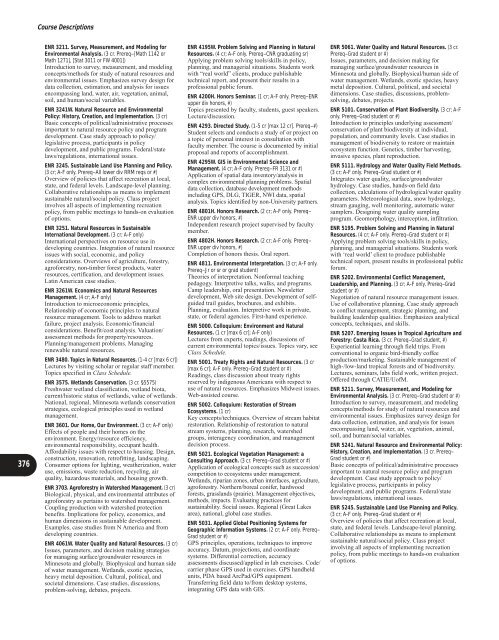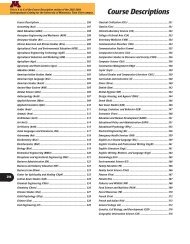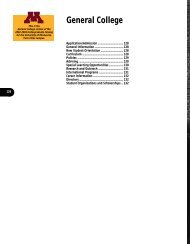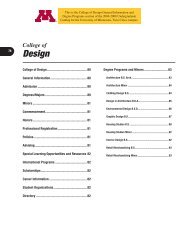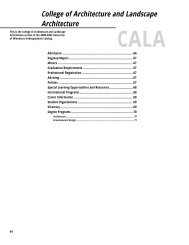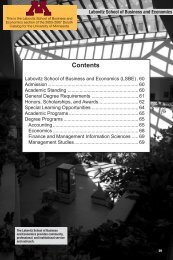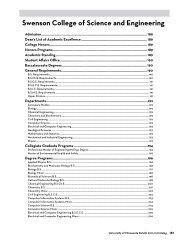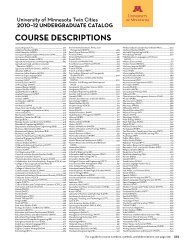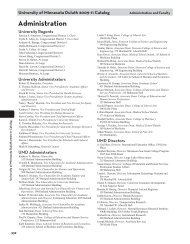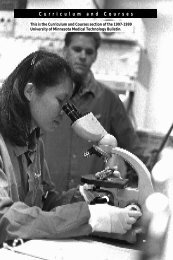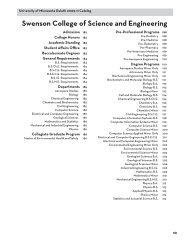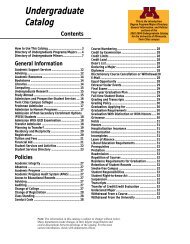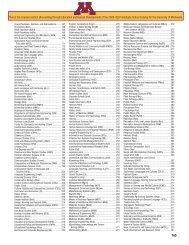CoursesâCSCI through FSCN - University Catalogs - University of ...
CoursesâCSCI through FSCN - University Catalogs - University of ...
CoursesâCSCI through FSCN - University Catalogs - University of ...
You also want an ePaper? Increase the reach of your titles
YUMPU automatically turns print PDFs into web optimized ePapers that Google loves.
Course Descriptions376ENR 3211. Survey, Measurement, and Modeling forEnvironmental Analysis. (3 cr. Prereq–[Math 1142 orMath 1271], [Stat 3011 or FW 4001])Introduction to survey, measurement, and modelingconcepts/methods for study <strong>of</strong> natural resources andenvironmental issues. Emphasizes survey design fordata collection, estimation, and analysis for issuesencompassing land, water, air, vegetation, animal,soil, and human/social variables.ENR 3241W. Natural Resource and EnvironmentalPolicy: History, Creation, and Implementation. (3 cr)Basic concepts <strong>of</strong> political/administrative processesimportant to natural resource policy and programdevelopment. Case study approach to policy/legislative process, participants in policydevelopment, and public programs. Federal/statelaws/regulations, international issues.ENR 3245. Sustainable Land Use Planning and Policy.(3 cr; A-F only. Prereq–All lower div RRM reqs or #)Overview <strong>of</strong> policies that affect recreation at local,state, and federal levels. Landscape-level planning.Collaborative relationships as means to implementsustainable natural/social policy. Class projectinvolves all aspects <strong>of</strong> implementing recreationpolicy, from public meetings to hands-on evaluation<strong>of</strong> options.ENR 3251. Natural Resources in SustainableInternational Development. (3 cr; A-F only)International perspectives on resource use indeveloping countries. Integration <strong>of</strong> natural resourceissues with social, economic, and policyconsiderations. Overviews <strong>of</strong> agriculture, forestry,agr<strong>of</strong>orestry, non-timber forest products, waterresources, certification, and development issues.Latin American case studies.ENR 3261W. Economics and Natural ResourcesManagement. (4 cr; A-F only)Introduction to microeconomic principles,Relationship <strong>of</strong> economic principles to naturalresource management. Tools to address marketfailure, project analysis. Economic/financialconsiderations. Benefit/cost analysis. Valuation/assessment methods for property/resources.Planning/management problems. Managingrenewable natural resources.ENR 3480. Topics in Natural Resources. (1-4 cr [max 6 cr])Lectures by visiting scholar or regular staff member.Topics specified in Class Schedule.ENR 3575. Wetlands Conservation. (3 cr. §5575)Freshwater wetland classification, wetland biota,current/historic status <strong>of</strong> wetlands, value <strong>of</strong> wetlands.National, regional, Minnesota wetlands conservationstrategies, ecological principles used in wetlandmanagement.ENR 3601. Our Home, Our Environment. (3 cr; A-F only)Effects <strong>of</strong> people and their homes on theenvironment. Energy/resource efficiency,environmental responsibility, occupant health.Affordability issues with respect to housing. Design,construction, renovation, retr<strong>of</strong>itting, landscaping.Consumer options for lighting, weatherization, wateruse, emissions, waste reduction, recycling, airquality, hazardous materials, and housing growth.ENR 3703. Agr<strong>of</strong>orestry in Watershed Management. (3 cr)Biological, physical, and environmental attributes <strong>of</strong>agr<strong>of</strong>orestry as pertains to watershed management.Coupling production with watershed protectionbenefits. Implications for policy, economics, andhuman dimensions in sustainable development.Examples, case studies from N America and fromdeveloping countries.ENR 4061W. Water Quality and Natural Resources. (3 cr)Issues, parameters, and decision making strategiesfor managing surface/groundwater resources inMinnesota and globally. Biophysical and human side<strong>of</strong> water management. Wetlands, exotic species,heavy metal deposition. Cultural, political, andsocietal dimensions. Case studies, discussions,problem-solving, debates, projects.ENR 4195W. Problem Solving and Planning in NaturalResources. (4 cr; A-F only. Prereq–CNR graduating sr)Applying problem solving tools/skills in policy,planning, and managerial situations. Students workwith “real world” clients, produce publishabletechnical report, and present their results in apr<strong>of</strong>essional public forum.ENR 4200H. Honors Seminar. (1 cr; A-F only. Prereq–ENRupper div honors, #)Topics presented by faculty, students, guest speakers.Lecture/discussion.ENR 4293. Directed Study. (1-5 cr [max 12 cr]. Prereq–#)Student selects and conducts a study <strong>of</strong> or project ona topic <strong>of</strong> personal interest in consultation withfaculty member. The course is documented by initialproposal and reports <strong>of</strong> accomplishment.ENR 4295W. GIS in Environmental Science andManagement. (4 cr; A-F only. Prereq–FR 3131 or #)Application <strong>of</strong> spatial data inventory/analysis incomplex environmental planning problems. Spatialdata collection, database development methodsincluding GPS, DLG, TIGER, NWI data, spatialanalysis. Topics identified by non-<strong>University</strong> partners.ENR 4801H. Honors Research. (2 cr; A-F only. Prereq–ENR upper div honors, #)Independent research project supervised by facultymember.ENR 4802H. Honors Research. (2 cr; A-F only. Prereq–ENR upper div honors, #)Completion <strong>of</strong> honors thesis. Oral report.ENR 4811. Environmental Interpretation. (3 cr; A-F only.Prereq–Jr or sr or grad student)Theories <strong>of</strong> interpretation. Nonformal teachingpedagogy. Interpretive talks, walks, and programs.Camp leadership, oral presentation. Newsletterdevelopment, Web site design. Development <strong>of</strong> selfguidedtrail guides, brochures, and exhibits.Planning, evaluation. Interpretive work in private,state, or federal agencies. First-hand experience.ENR 5000. Colloquium: Environment and NaturalResources. (1 cr [max 6 cr]; A-F only)Lectures from experts, readings, discussions <strong>of</strong>current environmental topics/issues. Topics vary, seeClass Schedule.ENR 5001. Treaty Rights and Natural Resources. (3 cr[max 6 cr]; A-F only. Prereq–Grad student or #)Readings, class discussion about treaty rightsreserved by indigenous Americans with respect touse <strong>of</strong> natural resources. Emphasizes Midwest issues.Web-assisted course.ENR 5002. Colloquium: Restoration <strong>of</strong> StreamEcosystems. (1 cr)Key concepts/techniques. Overview <strong>of</strong> stream habitatrestoration. Relationship <strong>of</strong> restoration to naturalstream systems, planning, research, watershedgroups, interagency coordination, and managementdecision process.ENR 5021. Ecological Vegetation Management: aConsulting Approach. (3 cr. Prereq–Grad student or #)Application <strong>of</strong> ecological concepts such as succession/competition to ecosystems under management.Wetlands, riparian zones, urban interfaces, agriculture,agr<strong>of</strong>orestry. Northern/boreal conifer, hardwoodforests, grasslands (prairie). Management objectives,methods, impacts. Evaluating practices forsustainability. Social issues. Regional (Great Lakesarea), national, global case studies.ENR 5031. Applied Global Positioning Systems forGeographic Information Systems. (2 cr; A-F only. Prereq–Grad student or #)GPS principles, operations, techniques to improveaccuracy. Datum, projections, and coordinatesystems. Differential correction, accuracyassessments discussed/applied in lab exercises. Code/carrier phase GPS used in exercises. GPS handheldunits, PDA based ArcPad/GPS equipment.Transferring field data to/from desktop systems,integrating GPS data with GIS.ENR 5061. Water Quality and Natural Resources. (3 cr.Prereq–Grad student or #)Issues, parameters, and decision making formanaging surface/groundwater resources inMinnesota and globally. Biophysical/human side <strong>of</strong>water management. Wetlands, exotic species, heavymetal deposition. Cultural, political, and societaldimensions. Case studies, discussions, problemsolving,debates, projects.ENR 5101. Conservation <strong>of</strong> Plant Biodiversity. (3 cr; A-Fonly. Prereq–Grad student or #)Introduction to principles underlying assessment/conservation <strong>of</strong> plant biodiversity at individual,population, and community levels. Case studies inmanagement <strong>of</strong> biodiversity to restore or maintainecosystem function. Genetics, timber harvesting,invasive species, plant reproduction.ENR 5111. Hydrology and Water Quality Field Methods.(3 cr; A-F only. Prereq–Grad student or #)Integrates water quality, surface/groundwaterhydrology. Case studies, hands-on field datacollection, calculations <strong>of</strong> hydrological/water qualityparameters. Meteorological data, snow hydrology,stream gauging, well monitoring, automatic watersamplers. Designing water quality samplingprogram. Geomorphology, interception, infiltration.ENR 5195. Problem Solving and Planning in NaturalResources. (4 cr; A-F only. Prereq–Grad student or #)Applying problem solving tools/skills in policy,planning, and managerial situations. Students workwith ‘real world’ client to produce publishabletechnical report, present results in pr<strong>of</strong>essional publicforum.ENR 5202. Environmental Conflict Management,Leadership, and Planning. (3 cr; A-F only. Prereq–Gradstudent or #)Negotiation <strong>of</strong> natural resource management issues.Use <strong>of</strong> collaborative planning. Case study approachto conflict management, strategic planning, andbuilding leadership qualities. Emphasizes analyticalconcepts, techniques, and skills.ENR 5207. Emerging Issues in Tropical Agriculture andForestry: Costa Rica. (3 cr. Prereq–Grad student, #)Experiential learning <strong>through</strong> field trips. Fromconventional to organic bird-friendly c<strong>of</strong>feeproduction/marketing. Sustainable management <strong>of</strong>high-/low-land tropical forests and <strong>of</strong> biodiversity.Lectures, seminars, labs field work, written project.Offered <strong>through</strong> CATIE/U<strong>of</strong>M.ENR 5211. Survey, Measurement, and Modeling forEnvironmental Analysis. (3 cr. Prereq–Grad student or #)Introduction to survey, measurement, and modelingconcepts/methods for study <strong>of</strong> natural resources andenvironmental issues. Emphasizes survey design fordata collection, estimation, and analysis for issuesencompassing land, water, air, vegetation, animal,soil, and human/social variables.ENR 5241. Natural Resource and Environmental Policy:History, Creation, and Implementation. (3 cr. Prereq–Grad student or #)Basic concepts <strong>of</strong> political/administrative processesimportant to natural resource policy and programdevelopment. Case study approach to policy/legislative process, participants in policydevelopment, and public programs. Federal/statelaws/regulations, international issues.ENR 5245. Sustainable Land Use Planning and Policy.(3 cr; A-F only. Prereq–Grad student or #)Overview <strong>of</strong> policies that affect recreation at local,state, and federal levels. Landscape-level planning.Collaborative relationships as means to implementsustainable natural/social policy. Class projectinvolving all aspects <strong>of</strong> implementing recreationpolicy, from public meetings to hands-on evaluation<strong>of</strong> options.


